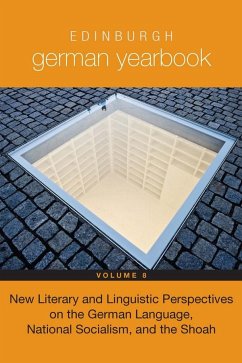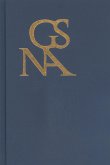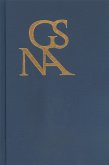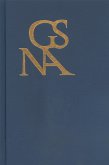Edinburgh German Yearbook 8
New Literary and Linguistic Perspectives on the German Language, National Socialism, and the Shoah
Herausgeber: Davies, Peter; Hammel, Andrea
Schade – dieser Artikel ist leider ausverkauft. Sobald wir wissen, ob und wann der Artikel wieder verfügbar ist, informieren wir Sie an dieser Stelle.
Edinburgh German Yearbook 8
New Literary and Linguistic Perspectives on the German Language, National Socialism, and the Shoah
Herausgeber: Davies, Peter; Hammel, Andrea
- Gebundenes Buch
- Merkliste
- Auf die Merkliste
- Bewerten Bewerten
- Teilen
- Produkt teilen
- Produkterinnerung
- Produkterinnerung
New perspectives on the relationship - or the perceived relationship - between the German language and the causes, nature, and legacy of National Socialism and the Shoah.
Andere Kunden interessierten sich auch für
![Habituation in German Modernism Habituation in German Modernism]() Meindert PetersHabituation in German Modernism130,99 €
Meindert PetersHabituation in German Modernism130,99 €![Goethe Yearbook 31 Goethe Yearbook 31]() Goethe Yearbook 3190,99 €
Goethe Yearbook 3190,99 €![Writing the Revolution Writing the Revolution]() Ingo CornilsWriting the Revolution40,99 €
Ingo CornilsWriting the Revolution40,99 €![The Brecht Yearbook / Das Brecht-Jahrbuch 45 The Brecht Yearbook / Das Brecht-Jahrbuch 45]() The Brecht Yearbook / Das Brecht-Jahrbuch 4580,99 €
The Brecht Yearbook / Das Brecht-Jahrbuch 4580,99 €![The Brecht Yearbook / Das Brecht-Jahrbuch 43 The Brecht Yearbook / Das Brecht-Jahrbuch 43]() The Brecht Yearbook / Das Brecht-Jahrbuch 4381,99 €
The Brecht Yearbook / Das Brecht-Jahrbuch 4381,99 €![Goethe Yearbook 9 Goethe Yearbook 9]() Thomas P. Saine (ed.)Goethe Yearbook 976,99 €
Thomas P. Saine (ed.)Goethe Yearbook 976,99 €![Goethe Yearbook 8 Goethe Yearbook 8]() Thomas P. Saine / Ellis Dye (eds.)Goethe Yearbook 890,99 €
Thomas P. Saine / Ellis Dye (eds.)Goethe Yearbook 890,99 €-
-
New perspectives on the relationship - or the perceived relationship - between the German language and the causes, nature, and legacy of National Socialism and the Shoah.
Produktdetails
- Produktdetails
- Verlag: Boydell & Brewer
- Seitenzahl: 256
- Erscheinungstermin: 28. November 2014
- Englisch
- Abmessung: 236mm x 156mm x 32mm
- Gewicht: 506g
- ISBN-13: 9781571135971
- ISBN-10: 1571135979
- Artikelnr.: 41372024
- Herstellerkennzeichnung
- Libri GmbH
- Europaallee 1
- 36244 Bad Hersfeld
- gpsr@libri.de
- Verlag: Boydell & Brewer
- Seitenzahl: 256
- Erscheinungstermin: 28. November 2014
- Englisch
- Abmessung: 236mm x 156mm x 32mm
- Gewicht: 506g
- ISBN-13: 9781571135971
- ISBN-10: 1571135979
- Artikelnr.: 41372024
- Herstellerkennzeichnung
- Libri GmbH
- Europaallee 1
- 36244 Bad Hersfeld
- gpsr@libri.de
Peter Davies, Andrea Hammel
Introduction: The German Language, National Socialism, and the Shoah German
Language and National Socialism Today: Still a German "Sonderweg"? Clear
Wording or "Historical" Euphemisms? Conceptual Controversies Surrounding
the Naming of National Socialist Memorial Sites in Germany "Lieber, guter
Onkel Hitler": A Linguistic Analysis of the Letter as a National Socialist
Text-Type and a Re-evaluation of the "Sprache im/des Nationalsozialismus"
Debate "German was heard so often in our Dutch home": German Nazi Refugees
in the Netherlands and Their Ambivalent Relationship with Their Mother
Tongue "Whose text is it anyway?" Influences on a Refugee Memoir Stigma and
Performance: Victor Klemperer's Language-Critical Reflections on
Anti-Semitic Hate Speech Reinventing Invented Tradition:
Vergangenheitsbewältigung and the Literature of Melancholy "Even the word
'und' has to be re-invented somehow": Quoting the Language of the
Perpetrators in Texts by Anne Duden "Reden ist Silber, Schweigen ist Gold":
German as a Site of Fascist Nostalgia and Romanian as the Language of
Dictatorship in the Work of Herta Müller The Power of Language and Silence:
Reinhard Jirgl's Die Stille "Disrupted Language, Disrupted Culture": Hanns
Eisler's Hollywooder Liederbuch (1942 43) "and all of a sudden, in the
middle of it, they began singing . . .": Languages and Commemoration in
Arnold Schoenberg's Cantata A Survivor from Warsaw (Op. 46) Understanding a
Perpetrator in Translation: Presenting Rudolf Höß, Commandant of Auschwitz,
to Readers of English Translating Testimony: Jakob Littner's Typescript and
the Versions of Wolfgang Koeppen and Kurt Nathan Grübler
Language and National Socialism Today: Still a German "Sonderweg"? Clear
Wording or "Historical" Euphemisms? Conceptual Controversies Surrounding
the Naming of National Socialist Memorial Sites in Germany "Lieber, guter
Onkel Hitler": A Linguistic Analysis of the Letter as a National Socialist
Text-Type and a Re-evaluation of the "Sprache im/des Nationalsozialismus"
Debate "German was heard so often in our Dutch home": German Nazi Refugees
in the Netherlands and Their Ambivalent Relationship with Their Mother
Tongue "Whose text is it anyway?" Influences on a Refugee Memoir Stigma and
Performance: Victor Klemperer's Language-Critical Reflections on
Anti-Semitic Hate Speech Reinventing Invented Tradition:
Vergangenheitsbewältigung and the Literature of Melancholy "Even the word
'und' has to be re-invented somehow": Quoting the Language of the
Perpetrators in Texts by Anne Duden "Reden ist Silber, Schweigen ist Gold":
German as a Site of Fascist Nostalgia and Romanian as the Language of
Dictatorship in the Work of Herta Müller The Power of Language and Silence:
Reinhard Jirgl's Die Stille "Disrupted Language, Disrupted Culture": Hanns
Eisler's Hollywooder Liederbuch (1942 43) "and all of a sudden, in the
middle of it, they began singing . . .": Languages and Commemoration in
Arnold Schoenberg's Cantata A Survivor from Warsaw (Op. 46) Understanding a
Perpetrator in Translation: Presenting Rudolf Höß, Commandant of Auschwitz,
to Readers of English Translating Testimony: Jakob Littner's Typescript and
the Versions of Wolfgang Koeppen and Kurt Nathan Grübler
Introduction: The German Language, National Socialism, and the Shoah German
Language and National Socialism Today: Still a German "Sonderweg"? Clear
Wording or "Historical" Euphemisms? Conceptual Controversies Surrounding
the Naming of National Socialist Memorial Sites in Germany "Lieber, guter
Onkel Hitler": A Linguistic Analysis of the Letter as a National Socialist
Text-Type and a Re-evaluation of the "Sprache im/des Nationalsozialismus"
Debate "German was heard so often in our Dutch home": German Nazi Refugees
in the Netherlands and Their Ambivalent Relationship with Their Mother
Tongue "Whose text is it anyway?" Influences on a Refugee Memoir Stigma and
Performance: Victor Klemperer's Language-Critical Reflections on
Anti-Semitic Hate Speech Reinventing Invented Tradition:
Vergangenheitsbewältigung and the Literature of Melancholy "Even the word
'und' has to be re-invented somehow": Quoting the Language of the
Perpetrators in Texts by Anne Duden "Reden ist Silber, Schweigen ist Gold":
German as a Site of Fascist Nostalgia and Romanian as the Language of
Dictatorship in the Work of Herta Müller The Power of Language and Silence:
Reinhard Jirgl's Die Stille "Disrupted Language, Disrupted Culture": Hanns
Eisler's Hollywooder Liederbuch (1942 43) "and all of a sudden, in the
middle of it, they began singing . . .": Languages and Commemoration in
Arnold Schoenberg's Cantata A Survivor from Warsaw (Op. 46) Understanding a
Perpetrator in Translation: Presenting Rudolf Höß, Commandant of Auschwitz,
to Readers of English Translating Testimony: Jakob Littner's Typescript and
the Versions of Wolfgang Koeppen and Kurt Nathan Grübler
Language and National Socialism Today: Still a German "Sonderweg"? Clear
Wording or "Historical" Euphemisms? Conceptual Controversies Surrounding
the Naming of National Socialist Memorial Sites in Germany "Lieber, guter
Onkel Hitler": A Linguistic Analysis of the Letter as a National Socialist
Text-Type and a Re-evaluation of the "Sprache im/des Nationalsozialismus"
Debate "German was heard so often in our Dutch home": German Nazi Refugees
in the Netherlands and Their Ambivalent Relationship with Their Mother
Tongue "Whose text is it anyway?" Influences on a Refugee Memoir Stigma and
Performance: Victor Klemperer's Language-Critical Reflections on
Anti-Semitic Hate Speech Reinventing Invented Tradition:
Vergangenheitsbewältigung and the Literature of Melancholy "Even the word
'und' has to be re-invented somehow": Quoting the Language of the
Perpetrators in Texts by Anne Duden "Reden ist Silber, Schweigen ist Gold":
German as a Site of Fascist Nostalgia and Romanian as the Language of
Dictatorship in the Work of Herta Müller The Power of Language and Silence:
Reinhard Jirgl's Die Stille "Disrupted Language, Disrupted Culture": Hanns
Eisler's Hollywooder Liederbuch (1942 43) "and all of a sudden, in the
middle of it, they began singing . . .": Languages and Commemoration in
Arnold Schoenberg's Cantata A Survivor from Warsaw (Op. 46) Understanding a
Perpetrator in Translation: Presenting Rudolf Höß, Commandant of Auschwitz,
to Readers of English Translating Testimony: Jakob Littner's Typescript and
the Versions of Wolfgang Koeppen and Kurt Nathan Grübler








